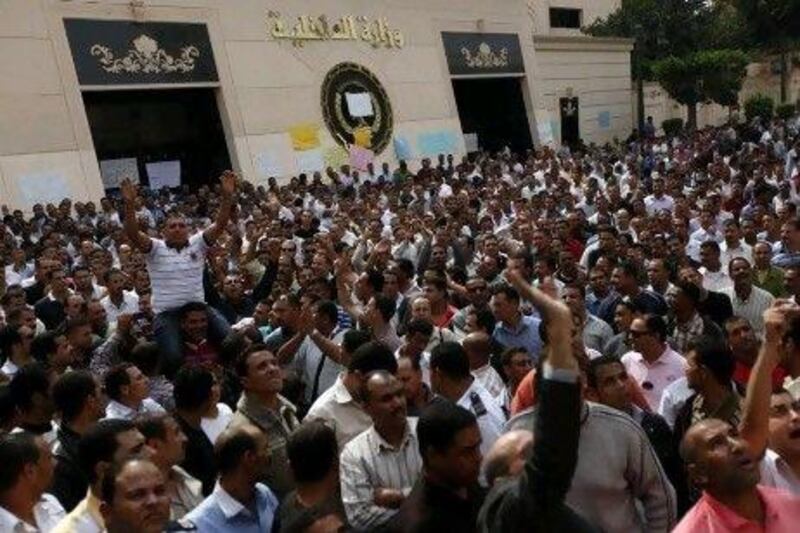CAIRO // When Egyptians were cheering the end of Hosni Mubarak's police state after the uprising last year, a group of officers began plotting their own quiet revolution within the ministry of interior.
Their idea spread to stations and police clubs across the country: officers should push for their own trade union and take control of reforms within the ministry.
They want a just wage, fewer working hours and new leaders. They say that the current ones are corrupt and turned the police into the right hand of Mr Mubarak's regime.
"Police reform must start with justice for the officers," said Ahmed Ragab, a police major in Alexandria who is part of the 4,000-strong General Alliance of Police Officers. "We know how to fix the ministry of interior."
His union and other police unions formed in the past year have yet to be recognised by the state because of a law that prevents policemen from unionising.
They are working with the parliament and the Federation for Independent Unions to change the law obstructing their recognition. They also are drafting reforms that they want approved.
The first step, Mr Ragab said, should be firing the top police generals.
Only then can working conditions be addressed and policies adopted that would "pivot around the security of the citizen, not the regime".
Despite the removal last year of Habib El Adly, the former top police chief who has been charged with ordering the killing of protesters, Egypt's police forces have faced one of their toughest years in history.
Police and the Egyptian military have been blamed for violence against protesters that killed more than 100 people since Mr Mubarak stepped down. There have been three different ministers.
Even now, weeks after the latest clashes between protesters and the police, Egyptian news programmes show officers' faces, alleging conspiracies to kill and instil chaos on behalf of the "remnants" of the old regime. When more than 70 people were killed at a football match in Port Said last month, the blame immediately fell on the police for failing to safeguard the stadium and check for weapons.
"For many years, Egypt was proud of its police," said Tamer Badran, a former police major who was part of the security detail guarding Mr Mubarak's sons until he resigned in 2006. "These days, all of my friends in the department are sad. There are calls to purify the police. The people blame them for everything that goes wrong."
Mr Badran, now an independent security consultant, said that most officers worked hard and behaved ethically. Yet, conditions had deteriorated over the years. Wages remained low and top officials used concerns about Islamist extremists to encourage the abuse of suspects.
"How do you expect a police officer to do his job and be courteous when he works 12-hour shifts, six days a week, for little pay?" Mr Badran said. "The training is not good enough. The equipment is not good enough. The problems have been there for years."
International observers have pointed to police reform as a "crucial" component of democratic transitions in Egypt, Libya and Tunisia.
"The greatest obstacle these authoritarian police forces face is their own organisational culture, which has encouraged torture and arrests without cause," wrote Andrew Exum and J Dana Stuster of the Center for a New American Security in a report last month. "Officers need to be retrained to respect human rights, and will have to learn how to conduct investigations without relying on forced confessions. The public will also have to be educated on what the proper role of the police is and how to engage them productively."
Mohamed Abdel Rasoul, who resigned as a lieutenant colonel in 2010, said he saw a culture of corruption spread throughout the ministry during his 21-year career. At the bottom level, traffic police would take small bribes to ease traffic for well-heeled Egyptians. And at the top, the minister and his top officials kept a fleet of some 50 luxury cars for their own use.
"Nothing has changed since the revolution, as far as I can see," he said. "The roots of the problem haven't been dealt with."
Allegations of torture are credible, he said, but he believes it was not as widespread as activists allege. The problem was that pressure was put on lower officers for quick resolutions of cases and they would use excessive force.
"We had bad police officers, just like any police in the world," he said. "To fix this, you can't just appoint a new minister. You need to look at the whole system."
For now, the General Alliance of Police Officers will operate without official recognition, said Mr Ragab, one of the organisers. The minister of interior, Mahmoud Ibrahim, has refused to meet them despite repeated requests.
"That might be because we are calling for his resignation, too," Mr Ragab said. "We will do whatever it takes to get rid of the old officials."
bhope@thenational.ae
Follow
The National
on
[ @TheNationalUAE ]
& Bradley Hope on
[ @bradleyhope ]





